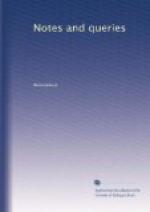Kentish Ballad (No. 16. p. 247.).—The song beginning “When Harold was invaded” has long been a favourite in this county. It is entitled “The Man of Kent,” and was composed by Tom Durfey, in the time of Charles the Second. It may be found, with the music, in Chappell’s Collection of English Airs. He cites it as being in Pills to purge Melancholy, with Music, 1719, and states that in the Essex Champion, or famous History of Sir Billy of Billericay and his Squire Ricardo, 1690, the song of “The Man of Kent” is mentioned. I have none of these works at hand for immediate reference, but the above note contains all that I have been able to collect on the subject of our popular ballad.
There is another song, much to the same purport, beginning—
“When as the Duke of Normandy,
With glistening spear and shield,”
in Evans’s Songs, vol. ii. p. 33, printed by him from The Garland of Delight, by Delone, in the Pepys collection at Cambridge—a black-letter volume; and probably the song was by himself.
Your correspondent “F.B.” asks for the remainder of the song. In pity to yourself and your readers, I forbear sending you the countless stanzas—numerous enough in the original song, but now, by the additions of successive generations, swelled to a volume. He will find in Chappell’s collection all that is worth having, with the assurance, repeated oft enough for the most enthusiastic of our modest countrymen, that
“In Britain’s race if one
surpass,
A man of Kent is he.”
LAMBERT LARKING.
Ryarsh Vicarage.
Bess of Hardwick (No. 18. p. 276.).—The armorial bearings of John Hardwick, of Hardwick, co. Derby, father of Bess, were: Argent, a saltier engrailed, and on a chief blue three roses of the field.
M. COMES.
Oxford, March 9. 1850.
Trophee (No. 19. p. 303.).—“Trophe,” in the Prologue of Lydgate’s Translation of Boccaccio’s Fall of Princes, is a misprint: corrige—
“In youth he made a translation
Of a boke, which called is Troyle,
In Lumbardes tonge, as men may rede and
se,
And in our vulgar, long or that he deyde,
Gave it the name of Troylous and Cres-eyde.”
The book called Troyle is Boccaccio’s Troilo, or Filostrato.
M.C.
Oxford, March 11. 1850.
{340}
Emerald (No. 14. p. 217.).—Before we puzzle ourselves with the meaning of a thing, it is well to consider whether the authority may not be very loose and inaccurate. This emerald cross, even if it was made of emeralds, might have been in several pieces. But we are told generally, in Phillips’s Mineralogy, that “the large emeralds spoken of by various writers, such as that in the Abbey of Richenau, of the weight of 28 lbs., and which formerly belonged to Charlemagne, are believed to be either green fluor, or prase. The most magnificent specimen of genuine emeralds was presented to the Church of Loretto by one of the Spanish kings. It consists of a mass of white quartz, thickly implanted with emeralds, more than an inch in diameter.”




